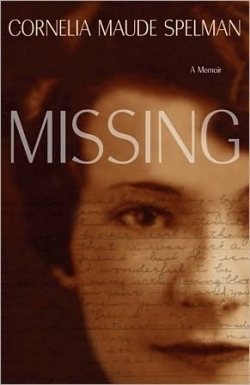
Missing
A Memoir
Anticipation over the arrival of Missing centers on the author’s connection to William Maxwell, legendary fiction editor at The New Yorker and old friend of Cornelia Maude Spelman’s parents. Maxwell and Spelman become acquainted in his later years; through him, she is able to see her parents as young people with potential, when previously she’d been saddened by what seemed like their mediocre, unsuccessful lives. Spelman is especially curious about her mother’s life, and Maxwell encourages her to write about her parents, suggesting that such existences can be more compelling than neater, happier lives. Maxwell’s presence dominates the first chapter with warmth, affection, and charm; later, his appearance in the book is sporadic, and just right: otherwise, readers might miss out on Spelman’s fine narrative voice and rich nonfiction storytelling skills.
The author of a successful series of children’s books, Spelman begins investigating her parents’ lives long after her mother’s death. Her excavation of Elizabeth Schneider Spelman’s story traces the historical truths of her mother’s choices and circumstances. In the 1920s, her parents and Maxwell were part of an intellectual literary circle at the University of Illinois. But by the time the author is born, the couple had traded in high ideals and artistic dreams for domesticity and a tenuous hold on the middle class, first in the Midwest and later the Massachusetts coast.
As the writer deconstructs her mothers’ remainders—letters, hospital records, diaries, photos, eulogies, newspaper articles, yearbooks, and other ephemera—she uncovers events and emotional rifts which shaped Elizabeth the girl, idealistic newlywed, resigned middle-aged mother of five, and frail matron whose life ended before old age. Following the matrilineal thread, Spelman travels to Iowa for a closer look at her roots.
Much of what she finds is routine and unremarkable, while the rest—those unsavory secrets that hide in most family closets—fills in the long empty blanks. Spelman adroitly treads the fine line separating anger from inquiry; her prose is compassionate, curious, and balanced.
Eventually, Spelman’s collection of documents and images finds a home in the Schlesinger Library/Radcliffe Institute at Harvard, where curators are assembling details of the “lives of ordinary American women.”
Early on, Maxwell writes to the author: “What you have had you will always have, if you are a rememberer.” She is. Describing a visit to her parents’ home after her mother’s been moved to a nursing home, Spelman writes, “Mother’s old jar of Pond’s face cream had been pushed to the side. I unscrewed the top and inhaled–its scent, like Aladdin’s lamp, evoking Mother.” In the end, the author is missing very little.
Reviewed by
Lisa Romeo
Disclosure: This article is not an endorsement, but a review. The publisher of this book provided free copies of the book to have their book reviewed by a professional reviewer. No fee was paid by the publisher for this review. Foreword Reviews only recommends books that we love. Foreword Magazine, Inc. is disclosing this in accordance with the Federal Trade Commission’s 16 CFR, Part 255.
